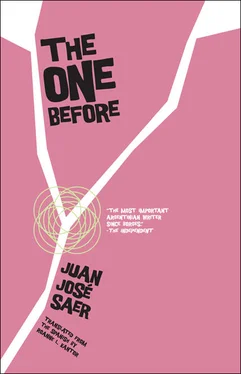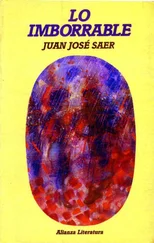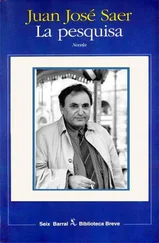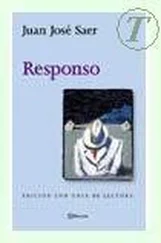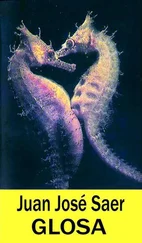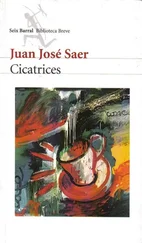As he turned on the neon sign, filling the black air over the pavement with a violet light, the salesman was seized with another memory: he had been looking for a pencil sharpener in his eldest son’s room when he stumbled upon a series of pornographic pictures his son had hidden in a dresser drawer. The salesman had put back the pictures immediately, less from embarrassment than from the fear that his son would think he was in the habit of snooping.
During dinner, the salesman observed his wife; for the first time in thirty years it occurred to him that she might also be keeping something hidden, something so personal and so deeply buried that, even if she wanted to, even under torture, she could not have confessed it. The salesman felt a sort of vertigo. It wasn’t some banal fear of being betrayed or swindled that made his head spin as if he were drunk, but the certainty that, just as he stood at the brink of old age, he might find himself compelled to modify the most elemental notions of his life. Or what he had called his life: because his life, his real life, according to his new intuition, turned out to be in another place, in the darkness, veiled from events, and that life seemed more remote to him than the very outskirts of the universe.
For the boys at the office it’s already completely natural, and almost all of them think of me as a good coworker. They even look out for me, and there is a tacit understanding between us whereby they accept me and I keep my private life out of the office, even though this divides my life in two. They consider me cultured, tasteful, delicate. It is difficult for a person like me to make it into his forties, I realize, and although they tolerate my idiosyncrasy, I feel that the time for revelries has ended and that maturity has come at quite a cost.
When book vendors come to the office, the boys always consult me before buying a set. I recommend Huxley (Aldous), Mauriac, Shakespeare, firstly because anyone can enjoy Shakespeare, and moreover because Shakespeare is such a well-respected author that someone might get offended if I didn’t recommend buying his complete works. I never recommend Oscar Wilde or André Gide so as not to arouse suspicion, but I myself read them with an enthusiastic sarcasm, I brandish them in silence as evidence, alone, against no one, in our ancient house in the south where my mother and sister, old and deaf, move about in the evening shouting and almost swimming in the violet light that filters through the blinds. Since my room is the one at the end of the hall and I am the one supporting the family, on the days I don’t stay out drinking wine until the last bars have closed in the wee hours of the morning, I receive “visitors.” Sometimes, in the past few years, I’ve been obligated to pay, or at least provide a little gift.
It’s just that there is a high price to seeing oneself in such bright light, a price that cannot be reckoned in cash or in kind. The others turn into me, and I am the others, so that I get back all that I give. To make the world in my image, I have had to turn myself into the world, and I spread myself out like it, offered up, open. I pass over the world along with everyone who passes over me. In the great mirror of love, the world and I regard each other, surprised, each in the guise of the other, attempting to read into that manifold inversion as into an impossible palimpsest.
My name is Pigeon Garay. I’ve lived in Paris for five years (Hôtel Minerve, 13, rue des Écoles, 5eme). Last year, in July, Carlos Tomatis dropped by for a visit. He was fatter than ever, nearly 200 pounds I’d guess, smoking cigarettes as he has been doing for the past seven or eight years, and we talked in my room, sitting before the window with the lights off, until dawn. I still remember the complex, rhythmic sound of his breathing emerging from the darkness as the temperature of our dialogue began to rise.
Two or three days later he went to London, leaving me to steep in an atmosphere of memories part-rancid, part-renewed, part-dead. There was something in that spider web of memories that recalled a living thing, the dying cub that trembles a bit, still warm, when one gently pokes it to see if it has died, with the tip of a stick or a finger. Afterward the thing stopped flowing and the animal went rigid, dead, made only of edges and cartilage.
My name, I say, is Pigeon Garay. So to speak.
Here you have me practically losing my voice and full of memories. They must be governed by some law; that is certain. But to discover that law it is necessary to empty oneself of them, to turn oneself inside-out like a glove. Everyone knows, anyway, that they obey no chronology. The philosophical prison we all carry within us has unleashed an assault onto our memories, decreeing unto them the fiction of chronology. And yet they continue, obstinately, to be our only freedom.
Let them at least become an obsession. Then they would obey a sort of law of exceptions, strict and absolute. Someone called them “ incessant.” With a regularity all their own, certain memories of the smallest incidents, without any apparent narrative content, return again and again to our consciousness, neutral and monotonous, until, having returned so often, our consciousness invests them with feelings and categorizes them: just as when a stray dog passes by to contemplate us silently, every day, in front of our door, we end up giving him a name.
A narrative could be structured simply by juxtaposing memories. It would just need a reader without illusions. A reader who, having read so many realist narratives that tell a story from beginning to end as if their authors possessed the laws of memory and of existence, aspired to something a bit more real. This new narrative, based purely on a foundation of memories, would have no beginning or end. It would be more of a circular narrative, and the position of the narrator would be like that of a boy who, riding a horse on a merry-go-round, tries at each pass to snatch a steel loop from the ring. It takes luck, skill, and continual adjustments of position, and having them all one would still come up most of the time empty handed.
There are many types of memories. Generalized memories, for example. During my childhood, during our summer siestas, my uncles would drive over from the neighboring village and the car’s chrome radiator, glittering in the sunlight, would be full of yellow butterflies smashed into the metal vents. The image that remains with me is not of any particular event. It is an abridgement, almost an abstraction, of all the times I saw radiators full of butterflies. And yet it is a memory.
There are also immediate memories: we are bringing a cup of tea to our lips when we remember, even before the cup reaches its destination, the previous moment when we lifted it noiselessly from the table. And I would even venture to say that there is also a category we could call simultaneous memories, which consist of remembering the instant we are living in the same instant we live it; that is, we remember the taste of this tea and no other, in the same moment we are drinking it.
There are intermittent memories, which flicker periodically like lighthouses. Distant memories with which we remember, or think we remember, the memories of others. And also memories of memories, in which we remember remembering, or which present us with the memory of a moment when we had remembered something intensely. As you can see, remembering is complex stuff. Memory itself is not sufficient to grasp it. Voluntarily or involuntarily, our memory cannot control the act of remembering; it is more accurately a servant to it. Our memories are not, as empiricists claim, purely illusions: but nevertheless an ontological scandal separates us from them, constant and continual and stronger than any effort we can exert to construct our lives like a narrative. That is why, from another point of view, we could consider our memories a region even more remote than the whole world outside ourselves.
Читать дальше
